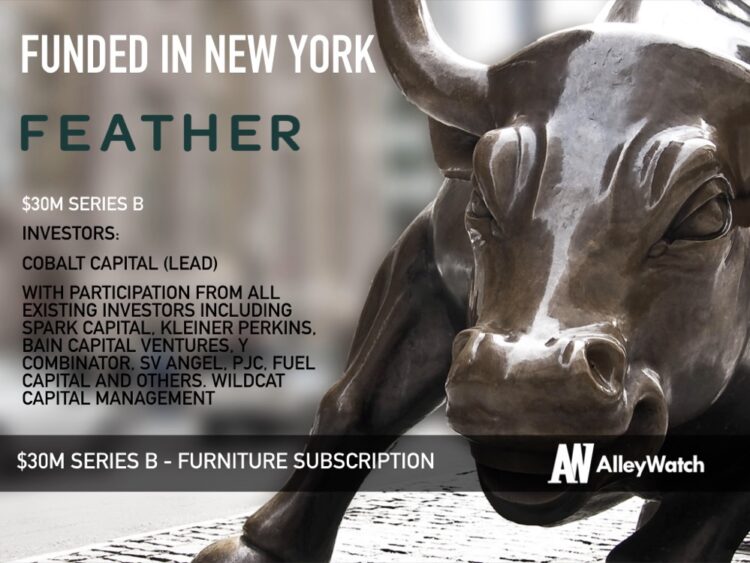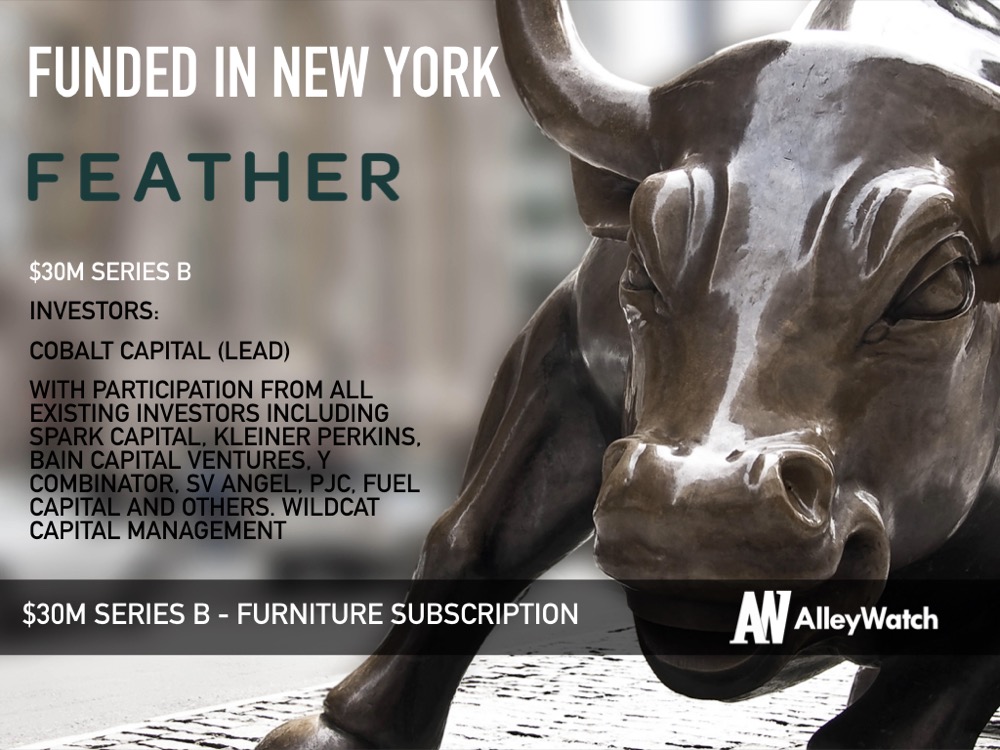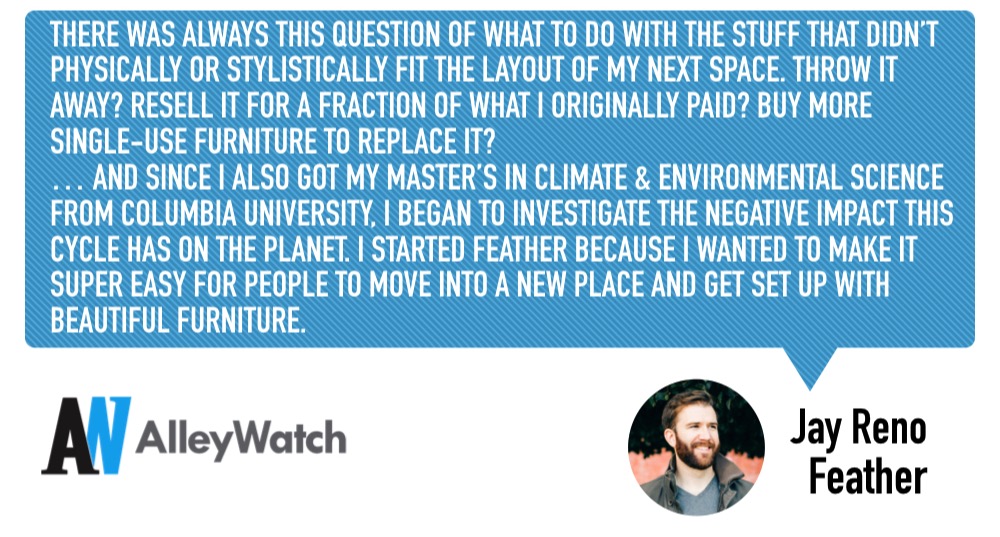Moving apartments in New York is a tiresome process and requires everyone to ask themselves, “What should I do with this furniture?”. This question is a lot easier to navigate with Feather, the next generation furniture rental service. A favorite of people in their 20s-30s, Feather’s pricing model ($19/month) gives access to more than 150 items of furniture, direct delivery, and full furniture assembly. While Feather makes furnishing your space easier than ever, inspired by a greater mission to reduce waste as furniture accounts for 7% of all landfill waste.
AlleyWatch caught up with Founder and CEO Jay Reno to learn more about the inspiration for Feather, its expansion to markets outside of New York, future growth plans, and latest round of funding, which brings the company’s total funding to $46M across four rounds.
Who were your investors and how much did you raise?
Our $30M Series B funding round was led by Cobalt Capital with participation from all existing investors including Spark Capital, Kleiner Perkins, Bain Capital Ventures, Y Combinator, SV Angel, PJC, Fuel Capital and others. Wildcat Capital Management, LLC also participated.
Feather is the first investment for recently launched Cobalt Capital, the former Evolution Media team who, in partnership with TPG Growth, have invested in notable subscription and digital content companies including Tonal, Calm, The Athletic, and MasterClass.
 Tell us about the product or service that Feather offers.
Tell us about the product or service that Feather offers.
Feather is the next-generation furniture rental service that makes it possible for people to find beautiful furniture quickly, without the upfront cost and commitment of traditional retail. By doing so, Feather is redefining furniture rental for city living and helping people feel at home no matter where they live or how long they plan on staying.
For $19/month you can become a Feather member and get access to 150+ items of stylish furniture at low monthly prices. Pick your items on our website and our team will deliver and set everything up within a week for free. Members can live with their furniture, then decide what makes the most sense for their individual lives. If a member chooses to buy a particular item, we’ll apply all previous furniture payments for that item toward ownership; so a member will never pay more than retail. Or they can simply return their furniture to Feather for responsible reuse. By giving people smarter options, Feather is able to keep more furniture in homes and out of landfills.
Feather is currently available in NYC, SF, LA and OC.
What inspired the start of Feather?
I’ve had 7 different apartments since I moved to New York 9 years ago. And every time I moved, there was always this question of what to do with the stuff that didn’t physically or stylistically fit the layout of my next space. Throw it away? Resell it for a fraction of what I originally paid? Buy more single-use furniture to replace it?
I personally didn’t like those options from the user experience standpoint. And since I also got my Master’s in Climate & Environmental Science from Columbia University, I began to investigate the negative impact this cycle has on the planet. I started Feather because I wanted to make it super easy for people to move into a new place and get set up with beautiful furniture. But I also wanted to create a more responsible solution to the furniture problem in this country. By giving members the option to buy-out items they love or return everything to Feather where it gets refurbished and redeployed, we’re creating a pattern of responsible reuse.
How is Feather different?
There are two key problems we’re trying to solve. From a macro perspective, furniture currently accounts for about 7% of all landfill waste, and 19.6 billion pounds are added to landfills every year. We’re trying to change that. People are moving more than ever, waiting longer to settle down. Because there are very few thoughtful, sustainable options for furniture in that life stage between college and buying your first home, most people resort to “fast furniture” that’s cheap and disposable after a year or two.
The second problem is that there aren’t many furniture options that are convenient for the way we live today. Most people might not even realize this until they experience some sort of change – whether it’s moving to a new apartment, switching roommates, changing their aesthetic, etc. We’re looking to provide greater freedom and flexibility to a new generation of renters who want to make smarter/more thoughtful decisions when it comes to their furniture.
Our teams are deeply knowledgeable about Feather’s product and they’re ultimately our biggest brand ambassadors; having them on the ground makes it possible to provide a best-in-class experience for our customers.
We’ve built strong feedback loops to capture their insights without relying on a third party, which means we can constantly improve our processes and make life easier for our customers.
Nominations closing soon for AlleyWatch’s 2020 NYC Tech Influencers feature. Know someone amazing who belongs on this list? Nominate them today here. FINAL DEADLINE 2/28. Looking to drive targeted response from the NYC Tech community at scale, learn more about partnering with AlleyWatch on this initiative here.
What market does Feather target and how big is it?
The furniture and home furnishing industry are a $275B business annually.
Feather is ideal for people who just moved or are about to move. Our customers tend to be people in their 20s and 30s living and renting in cities, but our offering is attractive to anyone who wants more flexibility and freedom in their life. The furniture itself is extremely stylish and designed to fit into apartment spaces, which makes it ideal for city living.
What’s your business model?
We always intended to create a model that would reduce the impact of furniture waste and intuitively work for how people live today. Through this approach, we have found success in the membership model because it caters to the flexibility and convenience that our customers want at a more reasonable price point.
A key differentiator in our business model is that we operate our last-mile fulfillment centers in each of our markets, and we dispatch our home deliveries from these facilities every day. All operations are managed by full-time Feather employees.
How has your business changed since we last spoke after Feather’s Series A?
One of the biggest milestones since our Series A is the expansion into LA and OC, which gave 384 new zip codes access to Feather. This is one of the reasons we’ve been able to deploy 3.4x more furniture into homes in the last year. We’re also extremely proud of the work we’ve done in the past year to expand our team.
What was the funding process like?
We have been fortunate enough to have an incredibly positive funding experience thus far. The response we get when we share our vision for Feather with investors is, “this makes sense, I wish this existed last time I bought furniture. I don’t even know how much time and money I would have saved.”
What are the biggest challenges that you faced while raising capital?
Our team has been incredibly resourceful and diligent about moving this business forward while engaging the right partners to grow. At the same time, because the cultural shift away from ownership is gaining momentum we were able to have engaging conversations with investors. Finding the right partner is often the difficulty, so we’re extremely happy that Dan Abrams and the broader team at Cobalt Capital shared our vision. They quickly proved they’d be a genuine pleasure to work with.
What factors about your business led your investors to write the check?
The concept of our offering and our strong sense of mission are two key components that distinguish Feather in the otherwise very static and traditional furniture landscape, and those elements create excitement in these conversations. As a company that’s been in business now for three years, we’re also able to prove that the business model can generate the kind of customer and revenue growth that investors are looking for at this stage.
What are the milestones you plan to achieve in the next six months?
We have a lot of exciting developments in the works that we’ll be able to talk more about in the coming months. Our team has been listening to feedback from our customers about the kinds of products they want to see in our offering, for example. And we’re also considering next steps for expanding the service to other cities. Feather’s offering would benefit a lot of cities across the U.S. where people are renting and moving frequently; we’re in the process of narrowing down the best candidates.
We are also focused on expanding our team. We currently have 60 employees and have plans to double this within the next year.
What advice can you offer companies in New York that do not have a fresh injection of capital in the bank?
As an entrepreneur who has founded three companies to date, I can confidently say when you lean into your passion and identify the solutions to modern-day problems, you will be able to develop a business model investors can get behind. I’ve always been passionate about the environment, and when designing Feather’s business model, I knew that sustainability had to be a cornerstone. By sticking to decisions that definitively serve your unique solution’s purpose, you will find success on multiple levels, leading to a scalable organization. These key tenants have been key to investor conversations and buy-in.
As an entrepreneur who has founded three companies to date, I can confidently say when you lean into your passion and identify the solutions to modern-day problems, you will be able to develop a business model investors can get behind. I’ve always been passionate about the environment, and when designing Feather’s business model, I knew that sustainability had to be a cornerstone
Where do you see the company going now over the near term?
Our $30M Series B funding round brings our total equity funding to $46M. This investment will be used to scale our owned reverse logistics infrastructure, expand into new markets and acquire new talent. We’re excited about the momentum and hitting these benchmarks in the near future.
Where is your favorite bar in the city for an after-work drink?
La Compagnie des Vins Surnaturels, a wine bar in Soho near our office.
Nominations closing soon for AlleyWatch’s 2020 NYC Tech Influencers feature. Know someone amazing who belongs on this list? Nominate them today here. FINAL DEADLINE 2/28. Looking to drive targeted response from the NYC Tech community at scale, learn more about partnering with AlleyWatch on this initiative here.






